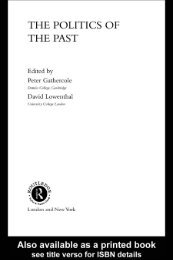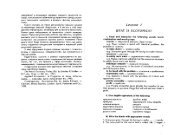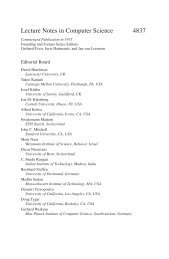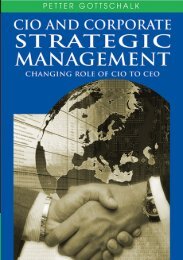- Page 1 and 2:
Lecture Notes in Computer Science 2
- Page 3 and 4:
Nata˘sa Jonoska Gheorghe Păun Grz
- Page 5 and 6:
Thomas J. Head
- Page 7 and 8:
VIII Preface portant to keep in min
- Page 9 and 10:
X Table of Contents Formal Properti
- Page 11 and 12:
Solving Graph Problems by P Systems
- Page 13 and 14:
Solving Graph Problems by P Systems
- Page 15 and 16:
Solving Graph Problems by P Systems
- Page 17 and 18:
Solving Graph Problems by P Systems
- Page 19 and 20:
Solving Graph Problems by P Systems
- Page 21 and 22:
Solving Graph Problems by P Systems
- Page 23 and 24:
Solving Graph Problems by P Systems
- Page 25 and 26:
where Solving Graph Problems by P S
- Page 27 and 28:
Solving Graph Problems by P Systems
- Page 29 and 30:
Solving Graph Problems by P Systems
- Page 31 and 32:
Solving Graph Problems by P Systems
- Page 33 and 34:
Writing Information into DNA Masano
- Page 35 and 36:
Writing Information into DNA 25 Ham
- Page 37 and 38:
Writing Information into DNA 27 Fig
- Page 39 and 40:
Writing Information into DNA 29 Dea
- Page 41 and 42:
5 Results 5.1 DNA Code for the Engl
- Page 43 and 44:
Writing Information into DNA 33 3.
- Page 45 and 46:
Writing Information into DNA 35 101
- Page 47 and 48:
Balance Machines: Computing = Balan
- Page 49 and 50:
+ .. . + Balance Machines: Computin
- Page 51 and 52:
x Balance Machines: Computing = Bal
- Page 53 and 54:
Balance Machines: Computing = Balan
- Page 55 and 56:
Balance Machines: Computing = Balan
- Page 57 and 58:
1 Balance Machines: Computing = Bal
- Page 59 and 60:
Eilenberg P Systems with Symbol-Obj
- Page 61 and 62:
2 Definitions Definition 1. A strea
- Page 63 and 64:
Eilenberg P Systems with Symbol-Obj
- Page 65 and 66:
Eilenberg P Systems with Symbol-Obj
- Page 67 and 68:
Eilenberg P Systems with Symbol-Obj
- Page 69 and 70:
5 Conclusions Eilenberg P Systems w
- Page 71 and 72:
Molecular Tiling and DNA Self-assem
- Page 73 and 74:
3 Molecular Self-assembly Processes
- Page 75 and 76:
Molecular Tiling and DNA Self-assem
- Page 77 and 78:
Molecular Tiling and DNA Self-assem
- Page 79 and 80:
Molecular Tiling and DNA Self-assem
- Page 81 and 82:
Molecular Tiling and DNA Self-assem
- Page 83 and 84:
Molecular Tiling and DNA Self-assem
- Page 85 and 86:
8 Hierarchical Tiling Molecular Til
- Page 87 and 88:
Molecular Tiling and DNA Self-assem
- Page 89 and 90:
Molecular Tiling and DNA Self-assem
- Page 91 and 92:
References Molecular Tiling and DNA
- Page 93 and 94:
Molecular Tiling and DNA Self-assem
- Page 95 and 96:
On Some Classes of Splicing Languag
- Page 97 and 98:
On Some Classes of Splicing Languag
- Page 99 and 100:
On Some Classes of Splicing Languag
- Page 101 and 102:
On Some Classes of Splicing Languag
- Page 103 and 104:
On Some Classes of Splicing Languag
- Page 105 and 106:
On Some Classes of Splicing Languag
- Page 107 and 108:
On Some Classes of Splicing Languag
- Page 109 and 110:
On Some Classes of Splicing Languag
- Page 111 and 112:
On Some Classes of Splicing Languag
- Page 113 and 114:
ˆxa ˆby ✬ ✩✬ ✩ a b x y
- Page 115 and 116:
On Some Classes of Splicing Languag
- Page 117 and 118:
The Power of Networks of Watson-Cri
- Page 119 and 120:
The Power of Networks of Watson-Cri
- Page 121 and 122:
The Power of Networks of Watson-Cri
- Page 123 and 124:
The Power of Networks of Watson-Cri
- Page 125 and 126:
The Power of Networks of Watson-Cri
- Page 127 and 128:
The Power of Networks of Watson-Cri
- Page 129 and 130:
Fixed Point Approach to Commutation
- Page 131 and 132:
Fixed Point Approach to Commutation
- Page 133 and 134:
Fixed Point Approach to Commutation
- Page 135 and 136:
Here the last one holds if and only
- Page 137 and 138:
Fixed Point Approach to Commutation
- Page 139 and 140:
� � � � � Fixed Point App
- Page 141 and 142:
Fixed Point Approach to Commutation
- Page 143 and 144:
Remarks on Relativisations and DNA
- Page 145 and 146:
Remarks on Relativisations and DNA
- Page 147 and 148:
Remarks on Relativisations and DNA
- Page 149 and 150:
Splicing Test Tube Systems and Thei
- Page 151 and 152:
Splicing Test Tube Systems 141 the
- Page 153 and 154:
Splicing Test Tube Systems 143 to a
- Page 155 and 156:
Splicing Test Tube Systems 145 6. R
- Page 157 and 158:
Splicing Test Tube Systems 147 (c)
- Page 159 and 160:
I0 Ai i Splicing Test Tube Systems
- Page 161 and 162:
Splicing Test Tube Systems 151 4. J
- Page 163 and 164:
Digital Information Encoding on DNA
- Page 165 and 166:
Digital Information Encoding on DNA
- Page 167 and 168:
Digital Information Encoding on DNA
- Page 169 and 170:
Digital Information Encoding on DNA
- Page 171 and 172:
Digital Information Encoding on DNA
- Page 173 and 174:
Digital Information Encoding on DNA
- Page 175 and 176:
Digital Information Encoding on DNA
- Page 177 and 178:
DNA-based Cryptography Ashish Gehan
- Page 179 and 180:
DNA-based Cryptography 169 concern.
- Page 181 and 182:
DNA-based Cryptography 171 The one-
- Page 183 and 184:
DNA-based Cryptography 173 of DNA t
- Page 185 and 186:
DNA-based Cryptography 175 Fig. 3.
- Page 187 and 188:
DNA-based Cryptography 177 the comp
- Page 189 and 190:
DNA-based Cryptography 179 can be c
- Page 191 and 192:
DNA-based Cryptography 181 4.4 DNA-
- Page 193 and 194:
DNA-based Cryptography 183 Fig. 7.
- Page 195 and 196:
DNA-based Cryptography 185 offer li
- Page 197 and 198:
DNA-based Cryptography 187 30. C. M
- Page 199 and 200:
Splicing to the Limit Elizabeth Goo
- Page 201 and 202:
Splicing to the Limit 191 molecular
- Page 203 and 204:
Splicing to the Limit 193 Discussio
- Page 205 and 206:
Example 9. The splicing rules are S
- Page 207 and 208:
−2α � kNNk = −2αMN, k α
- Page 209 and 210:
Finally we define the limit languag
- Page 211 and 212:
6 Conclusion Splicing to the Limit
- Page 213 and 214:
Formal Properties of Gene Assembly
- Page 215 and 216:
(a) (b) Formal Properties of Gene A
- Page 217 and 218:
Formal Properties of Gene Assembly
- Page 219 and 220:
Formal Properties of Gene Assembly
- Page 221 and 222:
Formal Properties of Gene Assembly
- Page 223 and 224:
n-Insertion on Languages Masami Ito
- Page 225 and 226:
n-Insertion on Languages 215 3. ∀
- Page 227 and 228:
n-Insertion on Languages 217 Theore
- Page 229 and 230:
Transducers with Programmable Input
- Page 231 and 232:
Transducers with Programmable Input
- Page 233 and 234:
1 01 s 0 Transducers with Programma
- Page 235 and 236:
order β l Transducers with Program
- Page 237 and 238:
Transducers with Programmable Input
- Page 239 and 240:
Transducers with Programmable Input
- Page 241 and 242:
Transducers with Programmable Input
- Page 243 and 244:
Transducers with Programmable Input
- Page 245 and 246:
Transducers with Programmable Input
- Page 247 and 248:
start tile Transducers with Program
- Page 249 and 250:
Transducers with Programmable Input
- Page 251 and 252:
Methods for Constructing Coded DNA
- Page 253 and 254:
Methods for Constructing Coded DNA
- Page 255 and 256:
u u Methods for Constructing Coded
- Page 257 and 258:
Methods for Constructing Coded DNA
- Page 259 and 260:
Methods for Constructing Coded DNA
- Page 261 and 262:
Methods for Constructing Coded DNA
- Page 263 and 264:
Methods for Constructing Coded DNA
- Page 265 and 266:
On the Universality of P Systems wi
- Page 267 and 268:
On the Universality of P Systems wi
- Page 269 and 270:
On the Universality of P Systems wi
- Page 271 and 272:
On the Universality of P Systems wi
- Page 273 and 274:
On the Universality of P Systems wi
- Page 275 and 276:
On the Universality of P Systems wi
- Page 277 and 278:
An Algorithm for Testing Structure
- Page 279 and 280:
An Algorithm for Testing Structure
- Page 281 and 282:
An Algorithm for Testing Structure
- Page 283 and 284:
An Algorithm for Testing Structure
- Page 285 and 286:
An Algorithm for Testing Structure
- Page 287 and 288:
An Algorithm for Testing Structure
- Page 289 and 290:
Definition 1. Define the relation
- Page 291 and 292:
280 Manfred Kudlek Definition 5. Co
- Page 293 and 294:
On Languages of Cyclic Words 283 Th
- Page 295 and 296:
On Languages of Cyclic Words 285 No
- Page 297 and 298:
On Languages of Cyclic Words 287 Th
- Page 299 and 300:
A DNA Algorithm for the Hamiltonian
- Page 301 and 302:
A DNA Algorithm for the Hamiltonian
- Page 303 and 304: A DNA Algorithm for the Hamiltonian
- Page 305 and 306: A DNA Algorithm for the Hamiltonian
- Page 307 and 308: Formal Languages Arising from Gene
- Page 309 and 310: Formal Languages Arising from Gene
- Page 311 and 312: Formal Languages Arising from Gene
- Page 313 and 314: Formal Languages Arising from Gene
- Page 315 and 316: Formal Languages Arising from Gene
- Page 317 and 318: Formal Languages Arising from Gene
- Page 319 and 320: A Proof of Regularity for Finite Sp
- Page 321 and 322: A Proof of Regularity for Finite Sp
- Page 323 and 324: A Proof of Regularity for Finite Sp
- Page 325 and 326: --- ◦ ❄ ⊗ γ ✲ A Proof of R
- Page 327 and 328: A Proof of Regularity for Finite Sp
- Page 329 and 330: The Duality of Patterning in Molecu
- Page 331 and 332: The Duality of Patterning in Molecu
- Page 333 and 334: Membrane Computing: Some Non-standa
- Page 335 and 336: where: Membrane Computing: Some Non
- Page 337 and 338: where: Membrane Computing: Some Non
- Page 339 and 340: Membrane Computing: Some Non-standa
- Page 341 and 342: Membrane Computing: Some Non-standa
- Page 343 and 344: Membrane Computing: Some Non-standa
- Page 345 and 346: Membrane Computing: Some Non-standa
- Page 347 and 348: Membrane Computing: Some Non-standa
- Page 349 and 350: The P Versus NP Problem Through Cel
- Page 351 and 352: The P Versus NP Problem Through Cel
- Page 353: The P Versus NP Problem Through Cel
- Page 357 and 358: The P Versus NP Problem Through Cel
- Page 359 and 360: The P Versus NP Problem Through Cel
- Page 361 and 362: The P Versus NP Problem Through Cel
- Page 363 and 364: Realizing Switching Functions Using
- Page 365 and 366: Realizing Switching Functions Using
- Page 367 and 368: AND Gate Realizing Switching Functi
- Page 369 and 370: NOR Gate Realizing Switching Functi
- Page 371 and 372: Plasmids to Solve #3SAT Rani Siromo
- Page 373 and 374: Plasmids to Solve #3SAT 363 A comme
- Page 375 and 376: Plasmids to Solve #3SAT 365 from th
- Page 377 and 378: Communicating Distributed H Systems
- Page 379 and 380: Communicating Distributed H Systems
- Page 381 and 382: Communicating Distributed H Systems
- Page 383 and 384: Proof Communicating Distributed H S
- Page 385 and 386: Communicating Distributed H Systems
- Page 387 and 388: Communicating Distributed H Systems
- Page 389 and 390: Communicating Distributed H Systems
- Page 391 and 392: Communicating Distributed H Systems
- Page 393 and 394: Communicating Distributed H Systems
- Page 395 and 396: Books: Publications by Thomas J. He
- Page 397 and 398: Publications by Thomas J. Head 387
- Page 399 and 400: Publications by Thomas J. Head 389
















